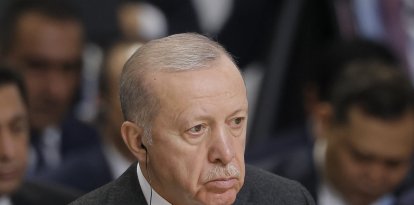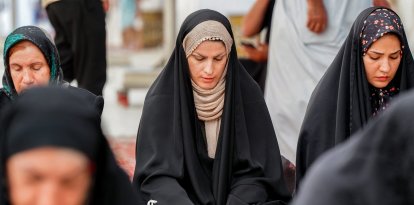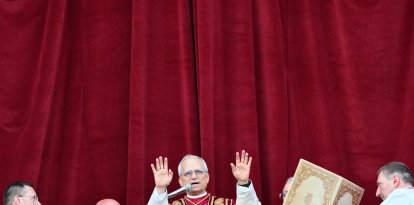Trump puts South Africa at a crossroads
What has led Trump to become the first major leader of a foreign country to act forcefully against the drift that for more than three decades is ruining Africa's most developed country?

Cyril Ramaphosa, ANC leader and South African president.
Those who persist in labeling Trump and brand him an isolationist fear a US retreat that would leave the world in the hands of rival powers like Russia and China. However, Trump's purported isolationism seems to be limited to his rejection of direct involvement in wars and any foreign intervention, military or otherwise, that does not bring the US a clear benefit.
Rather than a withdrawal from the world, what we are seeing in the early days of his second presidency is a sudden increase in US influence. If he continues the streak that Petro had the misfortune of experiencing, and which has now extended to Canada and Mexico. Trump will multiply the US impact in all corners of the globe while reducing the resources he devotes to influencing other regions.
A clear example of this is the war in Ukraine. Without even having begun to govern, and with his implacable rhetoric as his only instrument, the New York real estate mogul pushed both European leaders and the Democratic administration to accept the inevitability of a negotiated solution to the conflict. Amid complaints and warnings of the danger posed by Trump's return, his mere arrival at the White House has forced those who had ignored the harsh realities of the battlefield to start working on solutions—rather than sticking to unchanging slogans.
His decision to turn off the tap of international aid distributed by USAID will also have an impact on Ukraine. In addition to strategic chapters such as the Ukrainian public budget itself and the reconstruction of the energy system, a large part of USAID funds for Ukraine went to organizations and initiatives dedicated to promoting institutional reforms and democracy. It is precisely these funds that are least likely to continue, but the direct and transactional nature that characterizes Trump's action could give the reform process in Ukraine a far greater boost than the many millions spent by previous administrations on promoting something as abstract as values.
Trump has asked Zelenski for access to rare minerals held by Ukraine in exchange for continued military aid. Ukraine is in dire need of such continued aid. If US companies are to enter the Ukrainian market, the first thing Kiev must do is to provide the sector with predictability and legal certainty, and the urgency of the moment could save the country decades of delays in creating an adequate and corruption-free framework capable of attracting this type of investors.
More than that of non-intervention, the first guiding principle of Trump's foreign policy is self-interest, which implies that he will not always act in favor of freedom and justice. With a trip to Caracas by his envoy Ric Grenell, Trump secured the release of six Americans imprisoned by Maduro. According to a report by the Miami Herald, -which Grenell has disqualified as inaccurate but has not denied outright-, the deal allegedly allowed the Chávez regime to sell more oil to the U.S. in exchange.
More than non-intervention, the guiding principle of Trump’s foreign policy is self-interest, which means he won’t always act in favor of freedom and justice. With a trip to Caracas by his envoy Ric Grenell, Trump secured the release of six Americans imprisoned by Maduro. According to a report by the Miami Herald—which Grenell dismissed as inaccurate but did not deny outright—the deal allegedly allowed the Chávez regime to sell more oil to the U.S. in exchange.
A different case, in which the corrosive and torrential power projected by Trump is indeed favoring freedom and justice, is that of South Africa. Trump has lashed out against the racial policies of the African National Congress (ANC) - the main ruling party - following the approval in South Africa of a law directed against the hegemonic white minority in the country's agricultural sector that allows the expropriation of private property without offering compensation to the injured party.
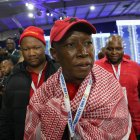
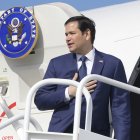
Politics
Marco Rubio will not attend G20 summit in South Africa: 'They are doing very bad things'
Agustina Blanco
In an executive order against "human rights violations in South Africa" issued in connection with the passage of the law, Trump denounces discrimination against European descendants in that country, offers the possibility of receiving as refugees persecuted Afrikaners and decrees the interruption of all US aid until the African National Congress dismantles its racist policies and protects white farmers and agriculturalists from the violent attacks they suffer.
What has led Trump to become the first major leader of a foreign country to act forcefully against the drift that for more than three decades is ruining Africa's most developed country?
First of all, his commitment to end any imbalance unfavorable to the US. Other countries with similarly oriented governments do not have the advantages that South Africa receives from the US. As Trump mentions in his executive order, the ANC misses no opportunity to align itself with all enemies of the US and manifests a special hostility against Israel. It does not fit in Trump's logic that whoever acts as a hostile force should benefit from privileges such as humanitarian aid or the free trade agreement that both countries have signed.
"Trump has put the South African government at the crossroads of choosing a path: either with the US and its friends or down the path of failed regimes whose main mission is to mock the US"
Another important factor is the prominence in Trump's court of a South African of origin like Elon Musk, who has been harshly criticizing for years the collectivist policies of the African National Congress. An evidently much smaller role, but not negligible, could have had Breitbart editor Joel Pollack, a South African Jew equally critical of the Pretoria government who also sounds like the new US ambassador to South Africa.
It could also have been influenced by the contacts established by Afriforum and its satellite organizations with the MAGA people, whom this Afrikaner lobby group fully self-sufficient thanks to its hundreds of thousands of members has kept the new American right wing informed for years about how personal and cultural autonomy and private property suffer at the hands of Mandela's party in South Africa.
But the prominence South Africa has taken in the early days of frenetic activity by the second Trump Administration is mostly due to the African National Congress. Many in the former liberation movement will be regretting choosing this moment to pass one of the key pieces of legislation to advance their project of disguised revolution. Just as many will be cursing the moment when Pretoria decided to openly embrace Iran and Hamas and raise just after October 7 the banner of fighting in international justice against Israel.
The crudeness, vehemence and clarity of Trump's diagnosis, and his willingness to take action, finally put the international spotlight on the real cause of the South African failure and tragedy, which is none other than the project of social engineering and gradual subjugation of society and the State that the African National Congress has been implementing since it came to power in 1994. It is ironic that the collision with the most powerful country in the world has come to the former liberation movement when it has the least power and is forced to share government with an opposition that does believe in equality among citizens and the right to property.
In the short term, Trump's pressure puts Afriforum and the other groups fighting the deterioration of security and freedoms in South Africa in the firing line. Almost all of the mainstream media and politicians from virtually the entire parliamentary spectrum have joined in the finger-pointing at those they accuse of being traitors to their homeland for calling for retaliation against their own country from a foreign power. Meanwhile, Afriforum and its satellites are working to convince Trump not to take measures that harm the national economy and limit his sanctions against South Africa to government leaders who support Hamas and undermine the rule of law with measures against the white minority.
Whether or not Trump listens to Afriforum on this, the US president's salvo against the African National Congress completely changes the rules of the game for a party accustomed to giving loose rein at the expense of its population to all its worst ideological and power impulses without paying any consequences.
According to the South African publication BusinessTech, South Africa's trade volume with the U.S. is seven times that of the country's trade with its Russian, Iranian and Palestinian partners. After disabling aid and opening the door to massive immigration of qualified whites, which will make even more dramatic the bleeding of talent and human capital that South Africa suffers since it turned away from devotion to merit, Trump still has to use the mother of all bombs which would be the expulsion of South Africa from AGOA, the free trade agreement with African countries from which the South African economy benefits so much.
Regardless of whoever uses it, Trump has put the South African government at the crossroads of choosing a path: either with the US and its friends or down the path of failed regimes whose main mission is to mock the US. Trump's disdain for detail and thoroughness plays once again in favor of the truth. Those in charge in South Africa can no longer cover it up with the fig leaf of ambiguity and nuance.


















